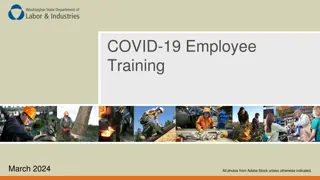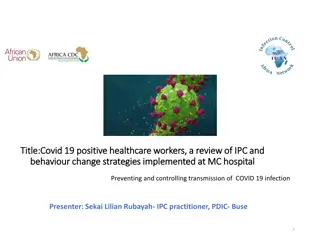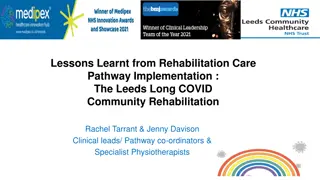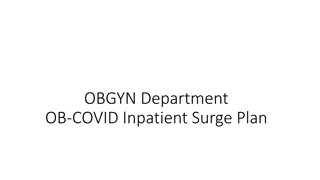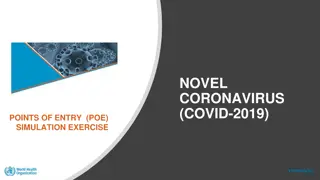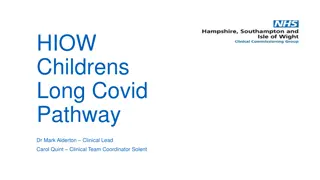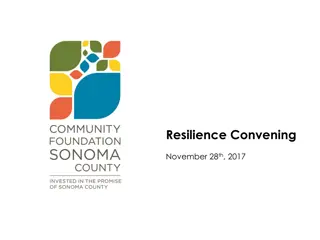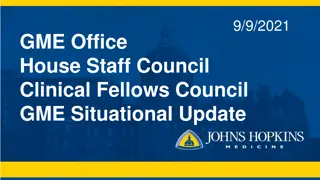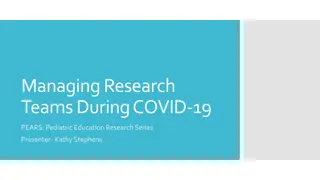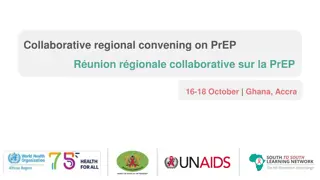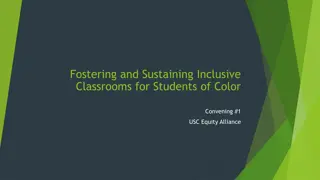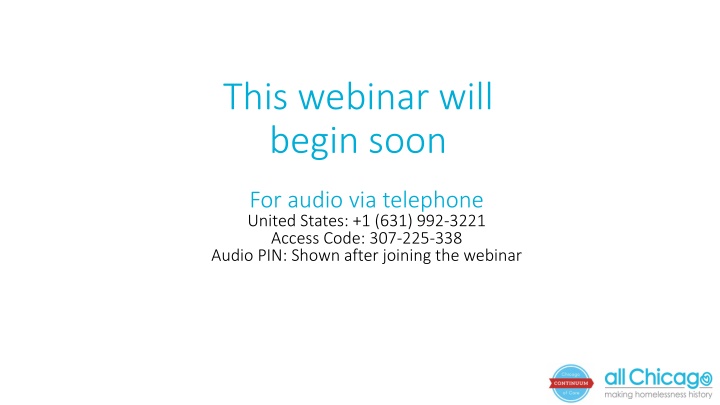
Chicago CoC Virtual Convening: COVID-19 Update and Support Plan
Join the Chicago CoC virtual convening for updates on COVID-19 support plans, including creating emergency funds, promoting communication, and addressing high-risk populations. Learn about best practices, guidance, and next steps in this collaborative effort to combat the pandemic effectively.
Download Presentation

Please find below an Image/Link to download the presentation.
The content on the website is provided AS IS for your information and personal use only. It may not be sold, licensed, or shared on other websites without obtaining consent from the author. If you encounter any issues during the download, it is possible that the publisher has removed the file from their server.
You are allowed to download the files provided on this website for personal or commercial use, subject to the condition that they are used lawfully. All files are the property of their respective owners.
The content on the website is provided AS IS for your information and personal use only. It may not be sold, licensed, or shared on other websites without obtaining consent from the author.
E N D
Presentation Transcript
This webinar will begin soon For audio via telephone United States: +1 (631) 992-3221 Access Code: 307-225-338 Audio PIN: Shown after joining the webinar
Chicago CoC Virtual Convening: COVID-19 (Coronavirus)
Topics for Today All Chicago s Plan to Support the CoC What Do You Need? Guidance Summary Peer Sharing / Q&A Next Steps
Three Areas of Focus (though the plan is evolving) Create and Manage Emergency Funds Identify highly-flexible resources for providers Create low-barrier process for application, funds transfer & reporting Promote Rapid Communication and Peer Sharing Dedicated webpage Slack Channel? Or other? Distilling and summarizing guidance and webinars Relaxing Rules and Requirements for All Chicago Programs Intent to Renew for HUD NOFA extensions can be granted RRH Programs (TBD waiting on confirmation from DFSS) CES (TBD waiting on confirmation from CSH) State Homeless Prevention Funds and Flexible Emergency Funds (TBD)
COVID COVID- -19 Basics 19 Basics COVID-19 is a respiratory virus that is primarily spread in the sameway colds and flu are spread: by droplets from coughs and sneezes. Symptoms include cough, fever and difficulty breathing. For the majority of people, the immediate risk of being exposed to the virus that causes COVID-19 is thought to be low. There is not widespread circulation in most communities in the United States.
High Risk Populations High Risk Populations Based on what we know so far, older adults and people with underlying medical issues are at higher risk of serious illness. If your shelter has individuals who are over 60 or have underlying medical conditions, create a plan to monitor their well-being. As of today, there are no confirmed cases of COVID-19 among people experiencing homelessness.
Addressing New Situations Addressing New Situations Review CDPH Coronavirus website at www.chicago.gov/coronavirus for local recommendations and updates, and www.cdc.gov/coronavirus for updates at the national level CDPH has established a COVID-19 inquiry line that is staffed by people familiar with common questions and answers, and able to do high level assessment to determine whether additional review by CDPH staff is needed. The number is 312-746-4835. The email address is coronavirus@chicago.gov
Reducing Risk of Infection Reducing Risk of Infection Avoid close contact with people who are sick. If there is a client who is showing signs of a fever or severe cold follow CDC Shelter Guidance. Encourage common sense precautions: Staff should stay home if they are sick, unless seeking medical care. Wash hands often with soap and water for at least 20 seconds. Use an alcohol-based hand sanitizer that contains at least 60% alcohol if soap and water are not available. Avoid touching your eyes, nose and mouth with unwashed hands. Cover your cough or sneeze with a tissue, then throw the tissue in the trash and wash your hands. Try alternatives to shaking hands, like an elbow bump or wave. Clean and disinfect frequently touched surfaces, such as doorknobs, countertops and phones. If anyone on your staff has recently returned from a country, state or region with ongoing spread of COVID-19, monitor their health and follow the instructions of public health officials. Source for link: https://www.cdc.gov/coronavirus/2019- ncov/community/homeless-shelters/plan-prepare-respond.html
Preparing Staff Make sure staff know who will be communicating additional information as it is available. Make sure you communicate regularly throughout the agency. Continue routinely cleaning all frequently touched surfaces; according to the CDC, no additional disinfection beyond routine cleaning is recommended at this time. Actively encourage sick employees to stay home, and develop a plan for your teams to accommodate staff shortages. Consider waiving the requirement for a healthcare provider s note for employees who are sick, as medical facilities may be busier than usual. Remind staff to practice good hand hygiene, as well as good sneeze and cough etiquette, and to limit close contact with residents.
Guidance Summary for Housing Providers (PSH, RRH, TH, AH) Help program participants secure essential supplies (medication, food, water, hygiene) Educate program participants on infection prevention and what to do if you think you are sick Refresh emergency contact lists for residents Refer residents to organizations in the community that can help in case of an outbreak in the area, such as organizations that provide mental health or counseling services, food, and other supplies.
Guidance Summary (Emergency Shelters) Activate your preparedness plans, take precautions with staff and guests, and educate to help prevent the spread of COVID-19. Triage situations and communicate them to CDPH. If DFSS Funded, email daily the # of residents who are in the vulnerable category (60+, people with underlying health conditions) Provide adequate supplies for good hygiene, including easy access to clean and functional handwashing stations, soap, paper towels, and alcohol based hand sanitizer (especially near food areas and restrooms)
Guidance Summary (Emergency Shelters) Increase frequency of cleaning of your facility common areas, kitchen and eating areas sleeping areas, bathrooms, toys. Refer guests who have concerns to their health care provider or nearest federally qualified health care center. Have acommunications plan in place and a location within the shelter (when possible) that would be used just in case a client has symptoms and need to be isolated until health officials and or transportation can be provided.
Guidance Summary (Outreach and Drop-In Centers) Practice Social Distancing Identify Healthcare Options Help Educate People Stand 6 feet away from clients for no more than 10 mins at a time. To find federally qualified health centers (FQHCs) in your assigned geographic location, Print materials and hand out Incorporate this into conversations with people. https://www.fqhc.org/find-an-fqhc please visit: https://www.fqhc.org/find-an- fqhc Sanitize hands with hand sanitizer and handwashing when possible. https://www.fqhc.org/find-an-fqhc Avoid touching your eyes, nose and mouth with unwashed hands. It is very important, if your staff is sick and experiencing flu like symptoms, to stay at home and seek medical attention.
Do these seem like the right next steps for All Chicago? AC to keep website updated? Y/N AC to monitor and support COVID-19 Slack Channel? Y/N AC to identify financial resources and publish application process ASAP? Y/N AC to convene providers weekly? Y/N
Provider Next Steps Convene a COVID Response Team @ your Agency Surveys Stay Up to Date Know the Guidance DFSS Food Support Survey (Christine Riley, for DFSS Funded Shelters) DFSS Shelter Communication survey (from Commissioner Butler, sent to EDs) Join Chicago CoC Slack Channel Sign-up to receive CDPH alerts Familiarize yourself with the key places for information: CDPH DFSS All Chicago HUD CDC Participate in Shelter Planning & Response exercises like this webinar Establish a Communication plan to get information throughout agency quickly.


